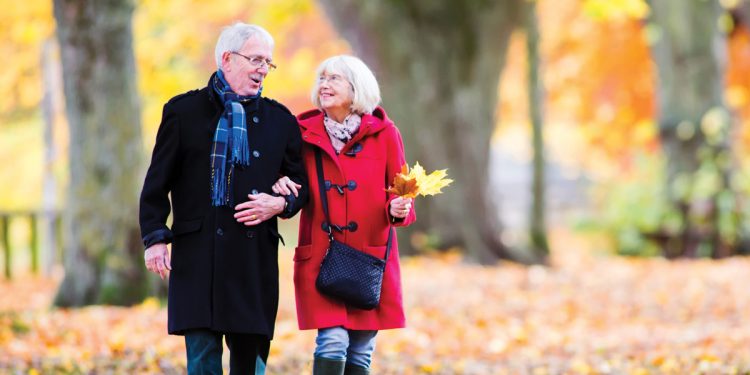Fall is upon us! It’s my favorite season of the year with the bright, beautiful autumn colors of Kentucky, cooler temps, fire pits, new sweaters and boots. This year, though, “fall” has a completely different meaning for me! After a recent injury, I’m less confident in stepping, standing and walking. My days are spent with calculated movements as I go from seated to standing, maneuvering stairs, getting in and out of the car, and just walking through my house without a 70-pound puppy knocking me over! Sound familiar?
One out of every three seniors will experience a fall each year, but only one of them will have spoken with their doctor about it, according to the Centers for Disease Control and Prevention. Falls are the number one cause of injury in seniors. Even if no serious injury is sustained, the fall can diminish one’s confidence so much that he or she begins withdrawing from activities, sometimes without even realizing it. I have experienced this for myself; after my injury, my confidence was so shaken that just holding my grandson causes waves of panic that I might lose my balance and topple.
Most of us know the basics: Discuss your medications with your doctor, wear sturdy footwear, keep walkways well-lit and free of clutter, don’t move too quickly, have appropriate assistive devices like adequately prescriptive eyewear, grab bars, grip tools, hand rails, and non-skid mats. But how many of us know how to evaluate our home for fall hazards?
Here are some things to look for in your own home to avoid injury.
Keep extension cords and telephone cords out of the flow of traffic. Place furniture where you will not need to use extra cords, but if you do, put it out of the way to avoid tripping on it. Rugs and runners are my vice—I love a splash of color to brighten my décor, but do we really want to be a splash on our own hardwood floor? Probably not, so we can apply double-faced tape to carpet or rubber matting, or buy rugs with a non-skid back. Make sure carpets and rugs are free of frayed edges, and are not curled up. In older floors, sometimes there are slight changes in elevation. Watch out for these because they can really throw one off balance. Arrange furniture so walkways are free of clutter. A waxed floor is pretty, but oh, so slippery! If you must wax, use a non-slip wax and buff thoroughly. Are all your hallways and rooms well-lit? I’m the worst about traipsing through without turning on a light, but as I recently discovered when I mistook a belt for a snake, I just don’t see as well as I used to! Add lighting if necessary, and use the maximum allowed wattage in your bulbs. Don’t be like me—turn the lights on when you go through the hallway or room. If the light switches aren’t accessible as you enter the room, find an electrician who can move them for you. There are even devices that can turn on your lights with a voice command! Always keep your telephone close by with emergency numbers posted nearby. Write them in large print so that if your glasses fall out of reach, you can still read them.
Finally, don’t be too proud to ask for help. Save your high-reach items for someone who can help you. There’s nothing wrong with asking someone to change your light bulbs, get your crock pot down from the top shelf, or help you move the items you use most often within reach. Most of us do not want to burden others, but I’ve found when I ask my family for help, they are happy I asked.
With the fall season comes outside natural risks, like fallen wet leaves or grass. These things can be very slippery, so stay alert and know where you’re stepping. A frost or snow is sure to happen in the upcoming months, too. Keep your walkways free of this type of danger.
Remember that many seniors avoid leaving their homes during the months of highest risk. Keep an eye out for your older relatives or neighbors, and when you have opportunity, sweep off a sidewalk, shovel a porch, or take their trash bin to the curb for them. Offer to pick up items at the grocery so they don’t have to get out during bad weather. Anything you can do to help prevent a fall would be greatly appreciated!
These are just some pointers for evaluating your own home and for managing your risk. At the Senior Community Center, we have access to a home safety checklist that you can perform yourself, which includes more extensive recommendations. Come visit us at 1650 W. Second St. If you need transportation or would like someone to visit your home to perform the assessment for you, just give us a call at 270-687-4640! Remember, avoiding a fall is much easier than dealing with the “fallout!”
Dana Peveler is the executive director of the Senior Community Center, which provides services, support and resources for seniors age 60 and older in Owensboro-Daviess County and the surrounding region.










